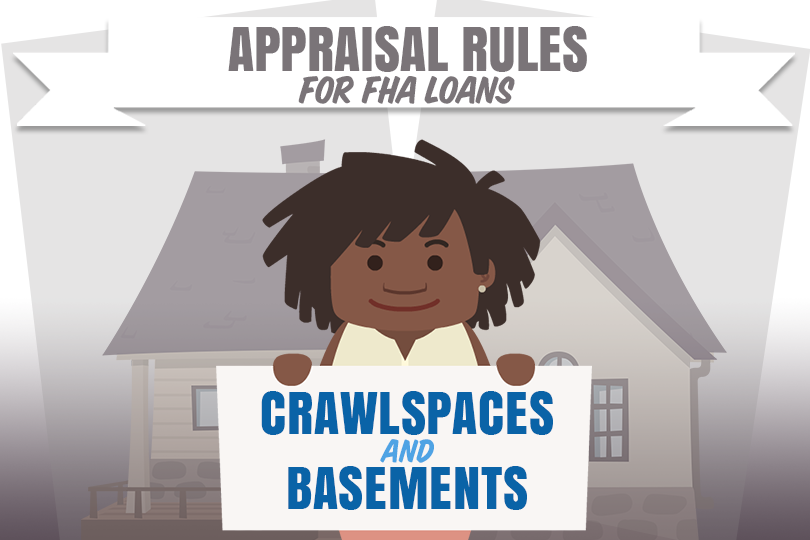FHA Appraisal Rules for Basements
May 7, 2022
You may not be on the hook for those corrections, but if you are trying to negotiate with a seller in a competitive market and you really want that house, negotiating who pays for the appraisal correction might be something to consider.
With that in mind, what are the FHA appraisal rules for a home that comes with a basement or crawlspace? The FHA appraisal process includes specific standards in this area which must be met. In cases where there are corrections required as a condition of loan approval, those corrections must be made and inspected--it’s not done on an honor system.
The basic rules in this area begin with the general condition of the foundation--it must be adequate to properly support the home.
HUD 4000.1 contains rules for the lender and appraiser. It states, “The Mortgagee must confirm that all foundations will be serviceable for the life of the Mortgage and adequate to withstand all normal loads imposed.” And what happens if this is not true?
The FHA list of “defective conditions” for basements, crawlspaces, and the foundation includes:
“…evidence of possible structural failure (e.g., settlement or bulging foundation wall, unsupported floor joists, cracked masonry walls or foundation)”
Such conditions would be noted by the appraiser--corrections are recommended where feasible but such corrections are not always possible. If the problems cannot be corrected, the home cannot qualify for an FHA mortgage.
The foundation and the basement should be “serviceable” over the entire duration of the loan term or must be repaired or modified to make that possible.
According to HUD 4000.1, “The Appraiser must perform a visual observation of the foundation and Structure of the improvements and report those results.” In cases where the FHA appraiser detects a structural issue, HUD 4000.1 says the Appraiser must “address the nature of the deficiency in the appraisal where physical deficiencies or adverse conditions” are reported and which may demand an inspection.
Basement issues may include things not directly related to the structural soundness of the foundation. For example, sump pump systems must be suitable to properly service the home and must be in good repair. If the appraiser notes the sump pump system does not meet these basic requirements, corrections are likely to be required in the appraisal report.
Any evidence of excessive moisture in a basement or crawlspace is an area of concern for the appraisal. If you note standing water, trickling water, or very damp basement walls when you do your initial walkthrough of any property, you can expect the appraiser to note the same problems.
------------------------------
RELATED VIDEOS:
Here's the Scoop on Conventional Loans
When Do You Need a Cosigner?
Analyzing Your Debt Ratio

FHA Loan Articles
June 15, 2023When you buy a home with an FHA mortgage, cash for closing costs and your down payment is required. It would be easy to assume you simply give the lender cash in the specified amount and that’s the end of the story.
May 20, 2023Did you know there is an FHA loan option that lets you build a house from the ground up? You can use this mortgage to build on land you own or on land you buy as part of the loan. But you will want to address some issues comparing construction loan options.
May 3, 2023Sometimes when buying a home there may be a question of surplus or excess land. You likely won’t face this issue when buying a condo unit, but for other types of purchases, this may be an important factor in the appraisal process.
April 18, 2023Your lender is required to make sure you can realistically afford your mortgage, and that means verifying that your income is stable, reliable, and will continue after your mortgage has closed. What some don’t realize about this process is that there are standards for verifying income.
April 1, 2023FHA loan rules for single family purchase loans include guidelines for the lender to use if the applicant has rental income. Some want to know whether it is possible to qualify for an FHA mortgage using rental income. The real issue is whether the rental income meets FHA loan rules.







